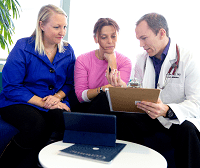Published: Thursday, October 17, 2019, 5:00 p.m. U.S. Central Time
Media Contact: Ann Klinck, 301.634.7342, press@ashg.org
Findings Reported at ASHG 2019 Annual Meeting

HOUSTON, Texas – Health reports from direct-to-consumer (DTC) genetic tests that use a limited variant screening approach often yield clinical false-negative results, which pose the risk of informing health care decisions based on incomplete information, according to findings presented at the American Society of Human Genetics (ASHG) 2019 Annual Meeting in Houston, Texas.
Limited variant screening tests provide information on a small, specific set of genetic changes, or variants, that are widely known to be associated with risk of a disease. However, every gene can have thousands of potential variants that are associated with disease.
While limited variant screens may be informative for the variants they detect, they are not designed to detect every variant that has been linked to the disease in question, explained Edward Esplin, MD, of Invitae, who presented the research. “Thus, these health reports may provide a false sense of reassurance and should not be used for making any health decisions without confirmation testing.”
Quantifying Test Effectiveness in Cancer Risk Screening
The U.S. Food and Drug Administration (FDA) has authorized marketing of health reports from DTC genetic screens for genetic risk of breast, ovarian and colorectal cancer.
“The goal of our study was to quantify the clinical false negatives resulting from a limited screening strategy and the need for that confirmatory testing, to help patients and their health providers understand what to do with the results for clinical care,” he said.
To this end, Dr. Esplin and colleagues focused on two FDA-authorized limited variant screening tests, one for the MUTYH gene, which detects two variants associated with colorectal cancer that are common among individuals of Northern European ancestry; and one for BRCA1 and BRCA2, which detects three variants associated with breast cancer and common in individuals of Ashkenazi Jewish descent. They studied 270,806 patients who had been referred by healthcare providers for MUTYH genetic testing, and 119,328 who had been referred for BRCA1/2 genetic testing.
For both tests, they found that if only the limited variant screenings had been performed, most patients would have received clinical false-negative results. For MUYTH, 40% of individuals with mutations in both of their MUTYH genes, consistent with almost 100% lifetime risk of colorectal cancer, would have been missed. An additional 22% of carriers of one MUTYH mutation, consistent with a 2-fold increased risk of colorectal cancer, would also have been missed. For BRCA1/2, the variants tested were significantly more common among Ashkenazi Jewish individuals, as expected. Nevertheless, even among these individuals, 19% would have received a false-negative, and 94% of non-Ashkenazi Jewish individuals had a BRCA1/2 mutation that would be missed.
“A clinical false-negative result can be incorrectly reassuring, excluding a patient from receiving the preventive care they need based on their risk. It could be the difference between preventing cancer and developing cancer,” said Dr. Esplin.
Understanding Differences among Populations
Looking more deeply at the results, Dr. Esplin’s team analyzed the rate of false negatives among patients of different ethnic backgrounds. For MUTYH, they found that 100% of Asians, 75% of African-Americans, 46% of Hispanics, and 33% of Caucasians would have received clinical false-negatives. Similarly, for BRCA1/2, 98% of Asians, 99% of African-Americans, 94% of Hispanics, and 94% of Caucasians would have received clinical false-negatives.
Through these results, Dr. Esplin emphasizes the medical value of in-depth, comprehensive clinical genetic testing, in the hope that with better information, people will gain greater access to genetic testing and information that can improve health care decisions. He is also hopeful his work will lead to access to clinical-grade genetic testing as a preventive measure, even for people who have no familial history of disease.
“The results from this type of DTC genetic screening may not be wrong but they are woefully incomplete, particularly when viewed against the health question a patient may be asking – am I at risk for cancer. We hope our research underscores the need for consumers to understand the deep limitations of these health reports and seek out appropriate clinical genetic testing when trying to understand their risk of health conditions like cancer,” said Dr. Esplin.
Media Interest: To learn more about Dr. Esplin’s work or set up an interview, please contact press@ashg.org to coordinate.
Reference: ED Esplin et al. (2019 Oct 17). Abstract: Limitations of direct-to-consumer genetic screening for hereditary breast, ovarian, and colorectal cancer risk. Presented at the American Society of Human Genetics 2019 Annual Meeting. Houston, Texas.
About the American Society of Human Genetics (ASHG)
Founded in 1948, the American Society of Human Genetics is the primary professional membership organization for human genetics specialists worldwide. Its nearly 8,000 members include researchers, academicians, clinicians, laboratory practice professionals, genetic counselors, nurses, and others with an interest in human genetics. The Society serves scientists, health professionals, and the public by providing forums to: (1) share research results through the ASHG Annual Meeting and in The American Journal of Human Genetics; (2) advance genetic research by advocating for research support; (3) educate current and future genetics professionals, health care providers, advocates, policymakers, educators, students, and the public about all aspects of human genetics; and (4) promote genetic services and support responsible social and scientific policies. For more information, visit: http://wptest.ashg.org.
6120 Executive Blvd, Suite 500 | Rockville, MD 20852 | 301.634.7300 | society@ashg.org | www.ashg.org
Connect with ASHG on Twitter (@GeneticsSociety) | Facebook | LinkedIn
